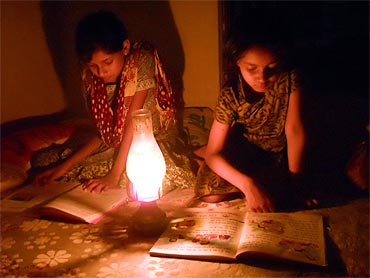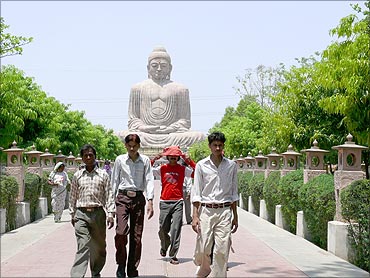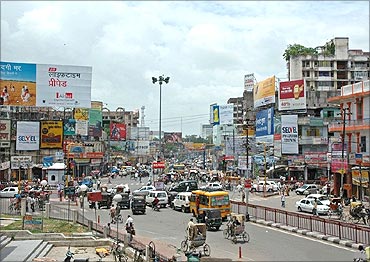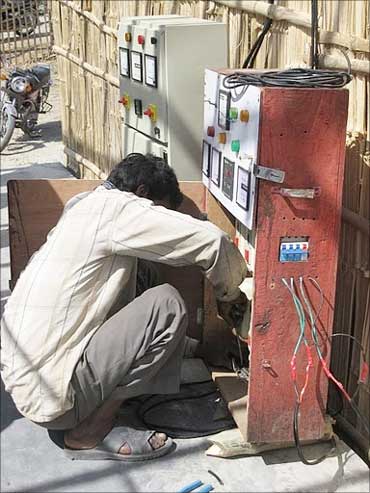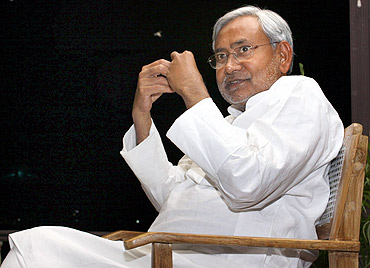 | « Back to article | Print this article |
Still in the lantern age: Bihar
If you live outside Patna in Bihar, you ought to have a lantern in your house. Large parts of the state go without electricity for days, thanks to the massive power shortage Bihar faces. With power generation options looking bleak in the distant future, Bihar continues to live in the dark from sundown. M I Khan reports
Anita Sinha and Lakshmi Singh curse their fate as they regularly clean lanterns and purchase costly kerosene oil from the black market to light up their homes, because of the acute power shortage in Bihar.
One of their biggest woes though, is missing popular television serials of their choice. The worst sufferers, however, are school-going children. And we are not even talking about students preparing for engineering and entrance exams.
Both housewives are among the millions in Bihar, who are virtually still living in the lantern age. "In this day and age of the internet, smart phone and 24-hour cable television, we are forced to live in virtual darkness," said Anita, a Bhagalpur resident.
The town witnessed huge protests from people in this connection, in the last one month.
"We have three lanterns in the house which are in regular use. There is hardly a night when we don't use them. The electricity mostly fails, so sitting in a hot and humid room throughout the night is almost routine," she said.
Lakshmi, a Gaya resident, had to purchase two hand-held fans, commonly known as haath pankha, to beat the heat. "24-hour electricity is a luxury we don't have. So, we have to rely on these methods," she said.
Click NEXT to read further...
'Patna gets most of the power'
About a million people who live in the town have a similar story to tell, and most of them have to rely on diesel or petrol operated generators, or solar lamps.
The story is not so different in Bodh Gaya, just 10 kilometres from Gaya, the internationally-renowned pilgrimage centre for Buddhists and Hindus alike. Here, too, the electrical supply is for no more than a few hours a day. Most hotels and restaurants in the town rely on generators to cater to their domestic, as well as foreign tourists.
Patna, the state capital, seems to be an exception though. "We are lucky to get a nearly 24-hour power supply, because we live in Patna. But for my parents, who live in a village in Begusarai district, have to go without power for days at end," said Amit Kumar, a journalist with a Hindi magazine.
He said the Bihar State Electricity Board provides adequate power supply to Patna, because most of the elite live there.
Click NEXT to read further...
Pay Rs 5 to charge your mobile phone!
For people living in semi-urban towns such as Aurangabad, Saharsa, Jehanabad, Sheikhpura and Motihari, lanterns and hand-held fans their best friends.
"There is hardly a night when we don't use lanterns," said Shahzad Alam, a school teacher in Aurangabad. Narendra Rai, a businessman from Saharsa, said, "If we get power at night, it's considered good luck, since its only then that we can hope to sleep for a few hours."
Just a few days ago, the people of Saharsa took to the streets, blockaded roads and attacked government offices, marking a 5-day shutdown in the town.
"Thanks to the uncertain power supply, kerosene sells at as much as Rs 40 a litre," said Rai. Needless to say, the situation is even worse in rural areas. People even pay Rs 2-5 to shopkeepers to charge their mobile phones!
Click NEXT to read further...Hardly any power to spare
Since mid-April, the power shortage has sparked protests in over two dozen districts in the state. Angry people took to streets, blocked roads for hours, burnt rubber tyres, forced shutdown of markets and electricity offices. They even attacked and ransacked other government offices.
While Bihar has a daily requirement of 2300-2,500 megawatts, it generates hardly 80 to 100 MW. The supply from the central grid is only around 750 to 900 MW.
"The state is facing a power deficit of about 1,000-1,200 MW a day," Hare Ram Pandey, an official from the BSEB said.
He said that whatever power Bihar receives from the central grid, 350M W has been earmarked for essential services. This includes 60 MW to Nepal (according to the agreement with the central government), 90 MW to the railways, 75 MW to continuous process industries and 35 MW to defence services and the airport.
"Bihar is supposed to get 1,170 MW from the central grid. It is a hard fact that Bihar faces a serious power crisis due to the shortage of supply from the central grid," " Pandey told rediff.com.
Click NEXT to read further...
'Nitish Kumar is just playing the blame game'
Bihar Energy Minister Bijendra Prasad Yadav has made it clear that the power situation cannot improve unless Bihar's own generation and central allocation is increased substantially. "At present the state is dependent on the Centre for allocating power from the NTPC's plants in the eastern region," Yadav said.
According to Yadav, Bihar plans to set up half a dozen new thermal, gas and biomass power plants. But the proposed plants by private sector companies will take at least three to four years before they start generating power.
The dark days in Bihar show no signs of letting up in the near future because the state's power generation is inadequate to light up even a big district like Patna.
Amit said nothing has changed as far as the power situation is concerned during Chief Minister Nitish Kumar's rule since November 2005.Ironically, Nitish Kumar has been blaming the Centre for the power shortage in Bihar instead of taking serious move to make a difference in the energy sector, he said.
Leader of the opposition Abdul Bari Siddiqui said the Nitish Kumar government has totally failed to improve the power situation. "Nitish Kumar is playing politics by blaming the Centre for poor allocation of power, instead of taking measures including spot power purchasing to improve the situation."
